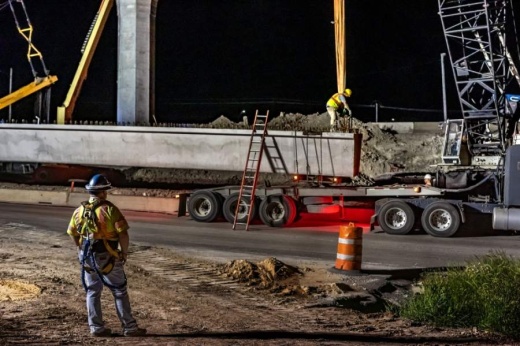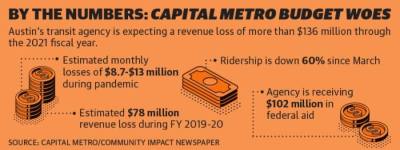RECENT TRANSPORTATION UPDATES
I-35 flyover constructionTexas Department of Transportation crews in early April installed several beams on the southbound I-35 to southbound US 183 flyover. Work continues on a shared-use path along the northbound I-35 frontage road near Rundberg Lane.
Timeline: January 2018-mid-2021
RM 2222 bypass and improvements
TxDOT crews are working on installing storm sewer lines down the center lane of RM 2222 from RM 620 to River Place Boulevard. Daytime closures are expected during this work. More utility work has begun between McNeil Drive and River Place Boulevard along RM 2222.
Timeline: Fall 2018-summer 2020
OTHER TRANSPORTATION NEWS
Construction continues on North Lamar upgradesThe city of Austin’s Corridor Construction Program is continuing work on several pedestrian improvement projects near the North Lamar Transit Center in North Austin, according to an April 3 newsletter.
Kelly Buethe, a senior public information specialist for Austin’s Corridor Program Office, said in an email that crews will work to install traffic signal and pedestrian improvements along North Lamar Boulevard at its intersections with Cooper Drive, Grady Drive, Fairfield Drive and West Powell Lane beginning sometime in April. The work is being funded through the city’s 2016 Mobility Bond.
The city will install a pedestrian crossing signal at Cooper, where a flashing light will tell motorists to stop for crossing pedestrians.
New smart traffic signals will be installed at the Grady, Fairfield and West Powell intersections, according to the city.
“Smart traffic signals will have the latest technology to reliably detect traffic and sync with other traffic signals along the corridor, helping to facilitate the efficient and safe flow of traffic,” Buethe said in an email to Community Impact Newspaper.
All of the intersection and pedestrian improvements will include high-visibility pedestrian crosswalks and Americans with Disabilities Act-compliant sidewalks. Work at these intersections are expected to continue through fall 2020, city documents show.
The West Powell intersection improvements will also include median adjustments to increase safety for crossing pedestrians, according to the city.
Motorists and nearby residents may also see lane closures along North Lamar between US 183 and Rundberg Lane in North Austin as city crews survey underground utilities, such as water lines and telecommunication lines, the city’s April 3 newsletter states.
Buethe in an email said the city “cannot pinpoint the exact locations on a daily basis” due to the nature of the work being done by crews.
The work hours available for construction crews throughout the day could be extended to 7 a.m.-6 p.m. as fewer motorists are on the road as a result of the city’s stay-at-home order, Buethe said.
Read the full story here.
Capital Metro projects an estimated $136 million in lost revenue
With sales tax revenue and fares on the decline, Capital Metro is preparing for a revenue loss of more than $136 million over the next two fiscal years.
“It could be $8.7 million-$13 million [in lost revenue] for each month that this crisis continues,” said Reinet Marneweck, Capital Metro’s chief financial officer, during the agency’s April 20 virtual board meeting.
The transit agency is estimating to see a $78 million revenue loss in fiscal year 2019-20 and could see a $58 million revenue loss in the FY 2020-21 budget because of recession concerns, she said.
Most of the loss, she said, is because of a 30%-50% reduction in sales tax revenue, which provides 80% of the agency’s total operating revenue. Jurisdictions from Capital Metro’s service area provide a 1% sales tax to the agency. Local businesses are temporarily closing or modifying operations because of the coronavirus.
Additionally, Marneweck said Capital Metro is losing fare revenue because of the reduction in service that began March 18. Ridership is down more than 60% as the agency stresses transit should only be used for essential trips.
To protect its drivers, employees and customers from the spread of the coronavirus, Capital Metro is also paying for additional bus cleanings and offering three weeks of paid sick leave for all employees and transit service provider employees.
“We have directed our contractors to keep all employees on staff and not to do any furloughs or layoffs,” Marneweck said.
To offset these losses, she said, Capital Metro will defer about $7.7 million in capital projects and $11.9 million in operating projects. Marneweck said Capital Metro has access to $111 million in unrestricted funds, including $61.5 million from its reserves.
The agency is also receiving a $102 million grant from the federal government’s Coronavirus Aid, Relief and Economic Security Act to cover operating expenses and lost revenue.
“It is 100% to keep the lights on,” Capital Metro President and CEO Randy Clarke said. “Without it, transit across this country would be decimated.”
Read the full story here.






